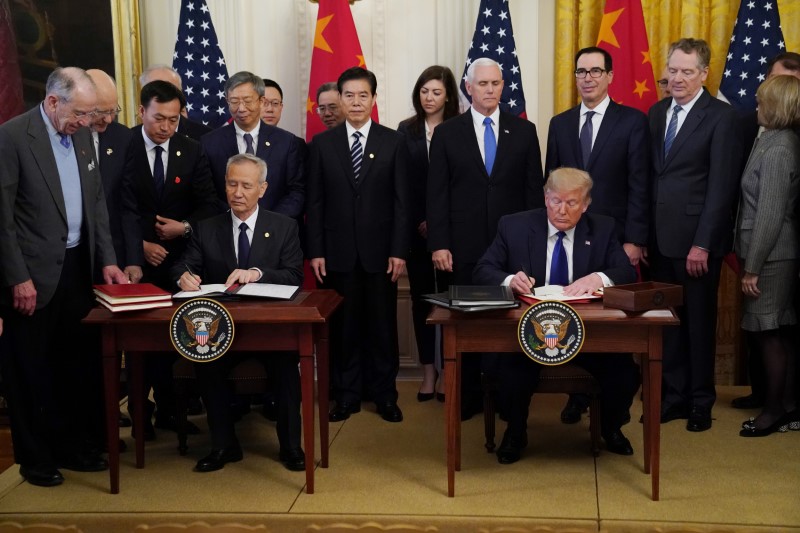By Gabriel D. Crossley
BEIJING (Reuters) - Chinese state media on Thursday warned against any "nitpicking" as Beijing portrayed the Phase 1 trade deal with United States and its new commitments to massive purchases of American goods as a boon for China's economy.
In return for some tariff relief, China agreed to buy at least $200 billion in additional U.S. goods and services over two years, including $32 billion more in imports of U.S. farm products - targets some analysts say may be tough to meet.
In the world's most populous nation, coverage was tightly managed and the trade deal quickly dropped out of the top 10 trending topics on the Twitter-like Weibo platform.
A person who works in censorship at Chinese social media giant ByteDance and a senior official at a state-backed media outlet told Reuters they had been instructed only to use official reports on the deal - guidance that is not unusual for sensitive political news.
Official media and government statements were upbeat with the People's Daily saying that boosting agricultural imports will "enrich the common people's dining tables."
An article in the same publication which bore the pen name "Zhong Sheng", usually used to express its views on foreign policy, said the pact was in line with China's reforms, opening up and the push for high-quality growth.
Foreign Ministry spokesman Geng Shuang said the Phase 1 agreement was good for both countries and the world when asked if he thought the deal was unfair.
China's Ministry of Commerce, which would normally comment on trade matters, earlier this week canceled its regular Thursday news briefing.
Robust debate was, however, not encouraged.
An editorial in the Global Times, a tabloid run by the People's Daily, stated that debating "about who had lost or gained is shallow."
"We urge individuals and forces to exercise some restraint in their nitpicking of the agreement and bad-mouthing future trade negotiations," it said.
The deal comes at a welcome time for President Xi Jinping, who faces a slowing economy, unrest in Hong Kong, and the recent re-election of the pro-independence party's President Tsai Ing-wen in Taiwan, said Wang Yiwei, a professor of international relations at Renmin University in Beijing.
"That China hasn't been defeated completely is already in itself a success," he said.
Some people on both the U.S. and Chinese sides are not satisfied with the agreement, but that is a good thing, said a post by Taoran Notes, an influential WeChat account run by the Economic Daily.
A deal where just one side was happy would "cause no end of trouble," it said.
